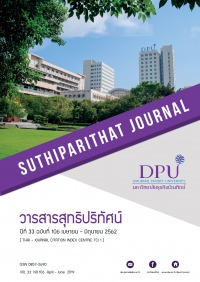บล็อกเชน เพชรฆาตคอรัปชั่น
คำสำคัญ:
บล็อกเชน, คอรัปชั่น, ความโปร่งใส, สามารถตรวจสอบได้บทคัดย่อ
งานวิจัยนี้เป็นส่วนหนึ่งของโครงการวิจัยขีดความสามารถของประเทศไทยแบบยั่งยืน ซึ่งอันดับขีดความสามารถของประเทศไทยจัดอยู่ในระดับกลางของโลกโดยสถาบันชั้นนำต่างๆ โดยไม่สามารถขยับขึ้นไปในระดับที่ดีขึ้นได้ด้วยสาเหตุหลายประการ ทั้งนี้ปัจจัยหนึ่งที่สำคัญคือการคอรัปชั่นและการฉ้อฉลที่อยู่กับสังคมไทยมาอย่างยาวนานจนมีความเชื่อว่าไม่มีทางกำจัดได้ แม้ว่าเริ่มมีการตรวจสอบการทุจริตในภาครัฐมาตั้งแต่ปี พ.ศ. 2476 มีการออกกฎหมาย จัดตั้งองค์กรและมาตราการ รวมทั้งกลไกการตรวจสอบมากมาย แต่นับวันการทุจริตในภาครัฐมีแต่จะมากขึ้น ในส่วนของภาคเอกชน ได้เกิดความร่วมมือเพื่อการต่อต้านการทุจริตมาอย่างต่อเนื่องนับตั้งแต่ปี พ.ศ. 2553 แม้จะเห็นผลลัพธ์ในทางที่ดีขึ้นแต่การคอรัปชั่นได้กลายเป็นประเด็นหลักในการพัฒนาประเทศ แต่อย่างไรก็ตามในปัจจุบัน ได้มีการนำเทคโนโลยีบล็อกเชนเข้ามาเป็นส่วนหนึ่งของการบริหารจัดการข้อมูลทั้งในภาครัฐและภาคเอกชน ด้วยโครงสร้างของเทคโนโลยีบล็อกเชน ธุรกรรมทางการเงินจึงไม่เพียงมีประสิทธิภาพและประสิทธิผลสูงสุด แต่ยังมีความโปร่งใสและสามารถตรวจสอบได้ ทุกครั้งที่มีธุรกรรมการเงินเกิดขึ้น จะมีการบันทึกในระบบที่ทุกคนเห็นได้ในทันที ทั้งจำนวนเงิน วัน เวลา สถานที่ และบุคคลที่เกี่ยวข้อง และใครก็ไม่สามารถทำการลบบันทึกออกจากระบบได้ รัฐบาลในหลายประเทศจึงได้ตัดสินใจนำบล็อกเชนมาใช้เพื่อจุดประสงค์ต่างๆ รวมทั้งเพื่อกำจัดคอรัปชั่นจนประสบความสำเร็จเช่นกลุ่มประเทศนอร์ดิกในยุโรปเหนือ บทความฉบับนี้ได้นำเสนอข้อมูล บทวิเคราะห์และข้อเสนอแนะให้ประเทศไทยเริ่มให้การศึกษาบล็อกเชนกับประชาชน พัฒนาระบบและนำมาใช้ ฐานของระบบบล็อกเชนควรเป็นแบบร่วมของทุกชุมชนโดยให้ทุกภาคส่วนร่วมวางระบบและเป้าประสงค์ให้ชัดเจน ซึ่งรวมถึงการกำจัดการโกงและฉ้อฉล ถึงเวลาของบล็อกเชนแล้วที่จะกำจัดคอรัปชั่นให้หมดไปจากประเทศไทย
เอกสารอ้างอิง
Blockgeeks Inc. (2018). What is blockchain technology? A step-by-step guide for beginners. Retrieved October 13, 2018, from https://blockgeeks.com/guides/what-is-blockchain-technology/
Borrows, M., Harwich, E., & Heselwood, L. (2017). The Future of public service identity: blockchain. Accenture Consulting U.K., 16 pp.
Bris, A., & Cabolis, C. (2018). IMD World Competitiveness Ranking 2018. IMD World Competitiveness Center. p. 5, 16-37, 44-50, 279-282
Chachavalpongpun, P. (2014). Thai junta beset by corruption scandals. The Diplomat – Asia-Pacific Magazine, October 12, 2014. Retrieved October 24, 2018, from https://thediplomat.com/2014/10/thai-junta-beset-by-corruption-scandals/
Collak, V. (2018). Blockchain Q&A. Forbes Magazine, October 25, 2018. Retrieved October 25, 2018, from https://www.forbes.com/sites/forbestechcouncil/2018/10/25/blockchain-qa/#a0f449b5ef7e
EU GDPR Organization. (2018). The EU general data protection regulation. Retrieved October 13, 2018, from https://eugdpr.org/
GAN Integrity. (2018). Thailand corruption report – September 2018. Retrieved October 14, 2018, from https://www.business-anti-corruption.com/country-profiles/thailand/
Georgieva, K. (2018). Doing business – Measuring business regulations. World Bank. 312 pp.
Le Masson, B., & Ward, C. (2018). Government as a platform. Accenture consulting. Retrieved October 16, 2018, from https://www.accenture.com/us-en/insights/public-service/government-as-a-platform
Lyon, N. (2016). Norway, Sweden and Denmark say “No” to cash. Cointelegraph – The Future of Money. Retrieved October 20, 2018, from https://cointelegraph.com/news/cash-electronic-money-scandinavia
Macaulay, T. (2018). How government around the world are using blockchain. IDG Computerworld. Retrieved October 18, 2018, from https://www.computerworlduk.com/galleries/applications/how-governments-are-using-blockchain-3680393/
Ministry of Finance. (2017). Building a new national trade platform – A vision for the future of Singapore Trade. Ministry of Finance report to the Parliament and the public. 16 pp.
Office of the National Anti-Corruption Commission. (2018). Power and duties of the national anti-corruption commission. Retrieved October 12, 2018, from https://www.nacc.go.th/ewt_news.php?nid=937
O’Hernaes, C. (September 2017). Banking is necessary, banks are not. Sbanken, Norway’s first online bank. Retrieved October 19, 2018, from https://hernaes.com/2017/09/11/banking-is-necessary-banks-are-not/
Piriyarangsan, S. (2018). The cost of corruption: Bt100 billion. Public Sector Anti-Corruption Commission (PACC). The Nation, September 19, 2018. p. 2A
Poomchusri, N. (2018). Blockchain and other modern tools to tackle corruption – Disrupting Corruption. Thailand’s 9th National Conference on Collective Action against Corruption Conference, Bangkok. 6 pp.
Ramvi, J. (2018). Blockchain in the Nordic Model. Blockchangers, April 23, 2018. Retrieved October 25, 2018 from https://medium.com/blockchangers/blockchain-in-the-nordic-model-6f2deff43a5
Schwab, K. (2018). The global competitiveness report 2017-2018. World Economic Forum. p. 317-325.
Tapscott, D. & Tapscott, A. (2016). Blockchain revolution. Portfolio Publishing. 368 pp.
Trading Economics. (2018). Thailand corruption index 1995-2018, trading economics. Retrieved October 19, 2018, from https://tradingeconomics.com/thailand/corruption-rank
Transparency International. (2018). Corruption perceptions index, transparency international organization. Retrieved October 13, 2018, from https://www.transparency.org/research/cpi
Vilner, Y. (2018). South Korea is cementing its place as a global blockchain leader. Forbes Magazine, August 23, 2018. Retrieved October 25, 2018, from https://www.forbes.com/sites/yoavvilner/2018/08/23/south-korea-is-cementing-its-place-as-a-global-blockchain-leader/#63849d579bc7
Zyskind, G., Oz, N., & Pentland, A. (2014). Decentralizing privacy: Using blockchain to protect personal data. USA: MIT Press.
ดาวน์โหลด
เผยแพร่แล้ว
รูปแบบการอ้างอิง
ฉบับ
ประเภทบทความ
สัญญาอนุญาต
เนื้อหาและข้อมูลในบทความที่ลงตีพิมพ์ในวารสารสุทธิปริทัศน์ ถือเป็นข้อคิดเห็นและความรับผิดชอบของผู้เขียนบทความโดยตรงซึ่งกองบรรณาธิการวารสาร ไม่จำเป็นต้องเห็นด้วย หรือร่วมรับผิดชอบใด ๆ
บทความ ข้อมูล เนื้อหา รูปภาพ ฯลฯ ที่ได้รับการตีพิมพ์ในวารสารสุทธิปริทัศน์ ถือเป็นลิขสิทธิ์ของวารสารสุทธิปริทัศน์หากบุคคลหรือหน่วยงานใดต้องการนำทั้งหมดหรือส่วนหนึ่งส่วนใดไปเผยแพร่ต่อหรือเพื่อกระทำการใด ๆ จะต้องได้รับอนุญาตเป็นลายลักษณ์อักษรจากวารสารสุทธิปริทัศน์ก่อนเท่านั้น







